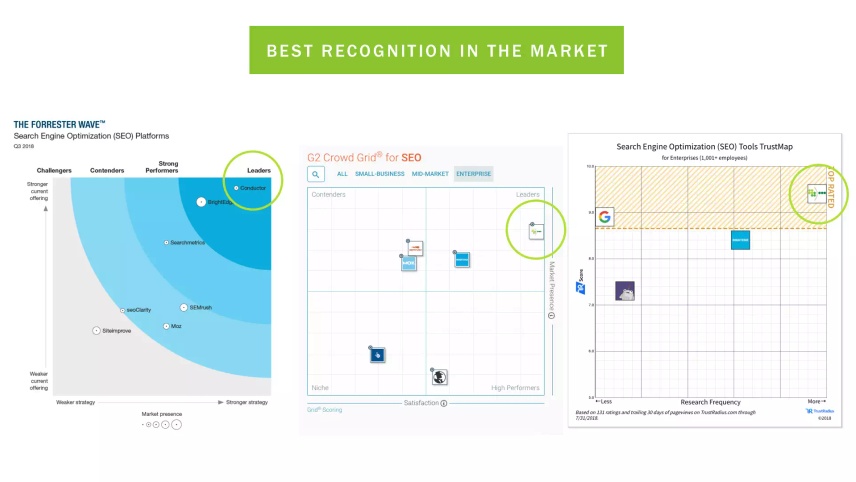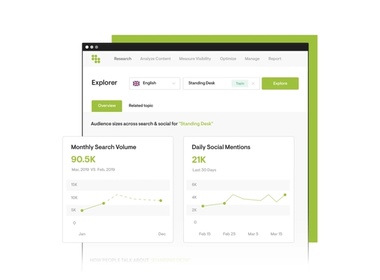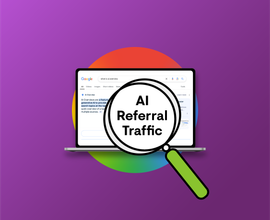What is an SEO Platform?
An SEO platform is a marketing technology that helps you manage, implement, and measure your brand’s presence in digital channels like Google’s organic listings.
SEO platforms offer you a comprehensive view of your website’s strengths, weaknesses, opportunities, and threats. Fully understanding their offerings and capabilities will help you choose the best SEO platform and ensure it aligns with your brand needs.
Organizations are waking up to the value of SEO. Organic search delivers over half of all trackable website traffic and customers click through at a higher rate on organic results than on paid media. A relevant organic search influences 39% of all purchasers, which is why more enterprises are investing in a comprehensive SEO platform to meet their needs.
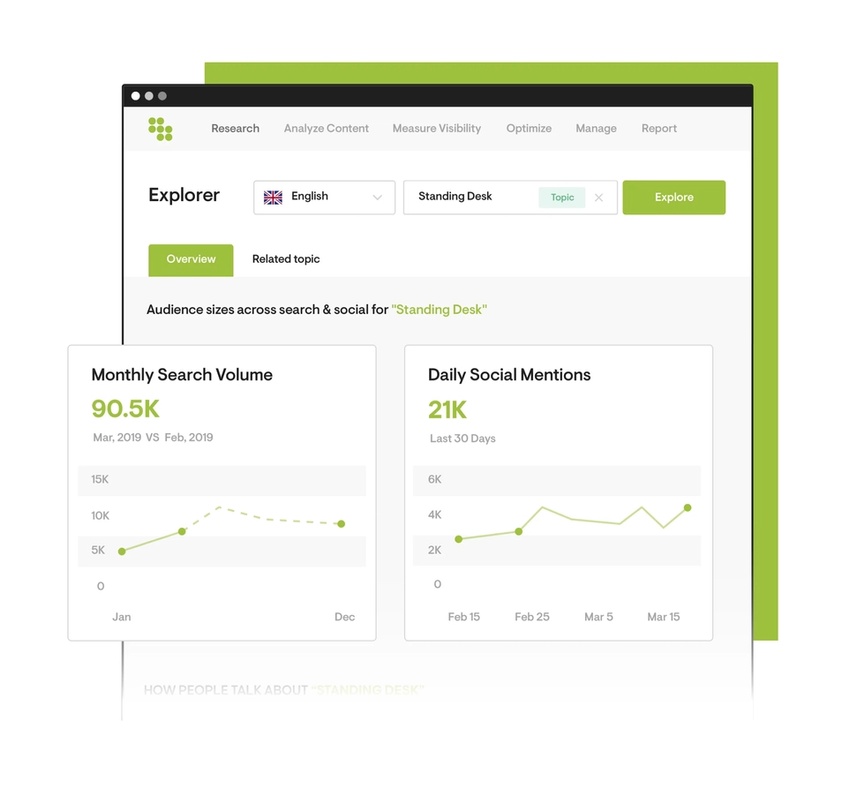
Understanding SEO Platforms
While marketers most commonly use SEO platforms for search engineSearch Engine
A search engine is a website through which users can search internet content.
Learn more optimization (SEO) and content strategy, SEO platforms, also known as SEO management platforms, can provide greater value—as a key source of audience intelligence.
Top SEO platforms show audience trends and topics that impact:
- Local foot traffic
- Online visibility
- Paid search
- PR
- Product launches
- Sales
- Website traffic
- And beyond
If you’re looking to level up your organic marketing efforts (also known as inbound marketing), your organization can benefit from a dedicated SEO platform. Your SEO platform should serve as both a system of record for changes on your site and a source of technical insights and content opportunities.
How SEO works?
SEO should be done with both consumers and search engines in mind, providing people with the information they are searching for and making it easy for search engines to understand your content. Do this well, and you can appear high on Search Engine Results Pages (SERPs) for relevant queries, bringing more organic traffic to your website.
Before pages on your website can show up in search results, they must be crawled and indexed by search engines. Every search engine has its own crawlersCrawlers
A crawler is a program used by search engines to collect data from the internet.
Learn more that traverse the internet. The found pages are then added to the search engine’s index.
When a user types a query into the search bar, the search engine returns the most relevant pages to the query, ranking them accordingly on the SERP.
What can SEO do for me?
Organic search and SEO are essential for companies looking to create lifetime value. Research shows that over the course of its life, a piece of content that ranks well organically delivers 10x the value of its paid counterpart, which stops driving traffic as soon as the money runs out.
What’s more, the organic performance of content gives you insight into audience intent. Search engines are a proxy for what people want – what you can learn about your customers from organic search data provides value far beyond just your website. Those SEO insights can drive decisions across your entire organization, aligning your strategy more closely to your customers’ needs at every level.
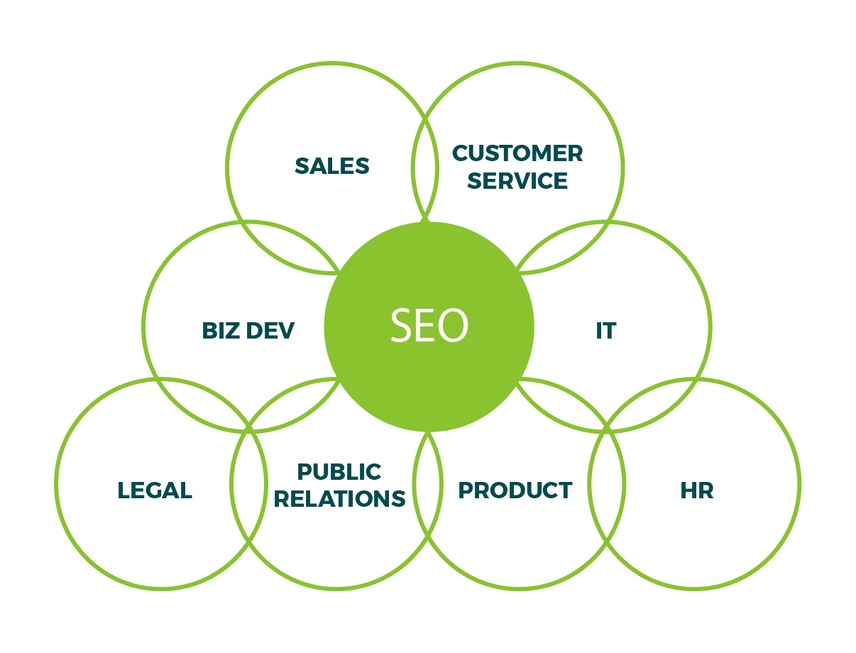
Content Optimization
To succeed with SEO, you need to follow the right steps. Skip a step, and you won’t get the results you’re hoping for. Optimize your content with SEO in five steps:
- Determine your content topic. When you take the time to understand what your audience is searching for with keyword research, you can craft content that gives them exactly what they’re looking for.
- Understand your content’s audience. Think about the types of audiences that your topics will attract. Write content in the language and terminology those audiences use.
- Identify your competitors. Look to see who’s appearing at the top of search results for the topics and keywords you’re targeting. Your competitors might be different across multiple verticals, so determine who owns the space.
- Implement SEO best practices. Start by optimizing on-page elements like title tags, meta descriptions, and header tags. These elements can be standardized across your website, helping Google clarify the structure and details of your site, which in turn draws in the right audience and improves rankings.
- Evaluate content performance. Monitoring performance is imperative to know what’s working and what’s not. Evaluate your content’s performance over time to determine if further optimization is needed to match the intent of your customers.
Competitive Analysis
Competitive analysis in SEO is the process of identifying any website that outranks you in search results for keywords and topics related to your business. You can analyze the competitive landscape in four steps:
- Identify your competitors. Analyze your primary competitors based on the search terms they’re ranking for. This will help you better understand their business initiatives, what content drives traffic for them, and how they position themselves in your industry.
- Compare content and rankings with the competition. During your analysis, you’ll likely discover previously unknown competitors ranking for your target keywords. These are your secondary competitors. This will allow you to identify the full scope of brands and publishers that are competing with your content, even if they do not directly compete with your product or service.
- Discover content opportunities to outrank the competition. One rule of a competitive analysis is to never assume. Base your SEO efforts on facts obtained by assessing the competitive landscape, conducting on- and off-page analyses, and analyzing your competitors’ marketing strategies.
- Optimize existing content or create new content. Identify where your pages rank for target keywords and look for opportunities to optimize existing content. “Striking distance” keywords, or keywords that rank on page 2 of search results, often present the best opportunity for optimization. If your target keywords are ranking too far outside of the striking distance—or aren’t ranking at all—consider creating new content that better addresses customer needs.
What is an SEO tool?
An SEO tool is technology that provides data and directional guidance to help you establish insights to create impactful content.
SEO tools empower you with the right technology and services to optimize your website and create content that both helps people and drives real business results.
Leverage SEO tools to identify the topics your audience is searching for and measure your website’s performance and organic search presence.
Are SEO tools worth it?
SEO tools can provide you with more ownership over your insights and data.
The approach you choose for SEO should be based on the time you’re willing to invest, your level of SEO savviness, and the marketing needs of your business. SEO tools are a good consideration as they provide you with dedicated support to get your organic marketing program off the ground. Tools allow you to enhance your SEO strategy and are a scalable solution for the future.
What is the difference between an Enterprise SEO platform and SEO tools?
As a digital marketer, it can feel like you’re being pulled in a million different directions. One of the most important benefits of an SEO platform over an SEO tool is a comprehensive view of the business value of your website and content with enterprise scale.
Enterprise SEO Platform
An Enterprise SEO Platform is designed to give you the big picture of your SEO efforts and performance and allows you to dig into the granular SEO insights individual tools provide. Even if you had access to the top 10 SEO tools on the market, you wouldn’t be getting the same value you’d find in a unified SEO platform.
Enterprise SEO platforms provide integrated insights and analytics, bringing together data from the best SEO tools to tell the whole story of your website’s value and performance. SEO platforms are designed to deliver insights to not only the search marketing team but also others who are less familiar with search data. This ensures that your team is maximizing the impact of search intelligence across the organization.
You need tools that can assist with immense SEO tasks. An enterprise SEO platform should have features that help with the following:
- Innovation: An enterprise SEO platform should give you creative ideas for future campaigns, like keywords that may not have been accounted for during the content ideation process. Generally, a theme for a campaign is decided first, but you may later find that audiences are looking for the same content in other ways. An SEO platform can be a great asset for discovering keywords that can turn searchers into customers.
- Automation: This is an essential feature for enterprise-level reporting. An enterprise SEO platform should be able to aggregate large data sets into a report that can be sent weekly, monthly, or quarterly. You’ll save time when you don’t need to dedicate countless hours to compiling raw data into a readable format.
- Integration: This is necessary for enterprise-level companies that use all digital marketing channels. Strategies and verticals need to be aligned between teams. Campaigns are more successful when there’s a team goal, not a personal goal.
SEO tools
Good SEO tools offer specialized analysis of a particular data point that can affect your search engine rankingsRankings
Rankings in SEO refers to a website’s position in the search engine results page.
Learn more. For instance, the bevy of free SEO tools out there provide related keywords as a form of keywordKeyword
A keyword is what users write into a search engine when they want to find something specific.
Learn more research. Data like this can be extremely valuable for particular SEO optimizations, but only if you possess the time and expertise to use it well.
Here’s how you can use an SEO tool for your website:
- Measure the current performance
- Uncover technical site issues
- Discover content opportunities
- Research the needs of your customer
- Find new keywords and topics to guide your content creation
- Explore original research to grow your digital marketing skills
- Present leadership with the financial impact of great SEO and content
What qualities and capabilities make the best SEO Platform?
The best SEO platform should empower marketers to understand and satisfy their customers’ needs. And it will likely also lead to the discovery of new needs or indicate that needs have evolved. Beyond hard technical metrics, your SEO platform should offer insight into and help with:
- Recommendations: Prioritize SEO actions that will have the most impact on your goals, so you can cut down on time-intensive research
- Audience: Understand your audience so you know who you’re serving
- Competition: Investigate competition so you always have the edge
- Visibility: Track SEO visibility so you can record wins and losses
- Content analysis: Analyze content performance so your customer journey is complete
- Content optimization: Optimize content so you’re always moving forward
- Reporting: Report and share wins and insights, so your whole organization can see the revenue you’re driving through SEO
- Efficiency: Save time for SEO professionals who would otherwise be inundated with data
- Collaboration: Offer collaborative opportunities for all team members, regardless of SEO fluency
An additional important consideration when evaluating SEO platforms is customer support. SEO platforms are most effective when combined with support that empowers your team to get the most value out of the platform’s insights and capabilities. Ask whether an SEO platform includes the right level of support—think of the decision as purchasing not just a platform but a true partner that is invested in and working alongside you to achieve your organization’s goals.
Interested in how an SEO platform can help you?
Request a free SEO assessment to show how an SEO platform may help your business.
Which Platform is best for SEO?
The Enterprise SEO Platform space has five main players including Conductor, Botify, and BrightEdge. Don’t let the size of the field fool you—there are key differences between these SEO platforms, so be sure to investigate thoroughly before choosing which is the best fit for your business needs.
Real customer reviews are a great place to start when evaluating potential enterprise SEO Platforms. We’re proud to be one of TrustRadius’s top-rated SEO technologies and a G2 Crowd Leader in the SEO space. We wanted to share a couple of reviews we’re particularly excited about.
Reviews of Our SEO Platform
The service and support are amazing. It makes me feel like I have a team working with the Conductor team. The tool is perfection, but the support really elevates it all.
We love Conductor! The platform, the people – our relationship with you guys has helped our whole team to grow professionally as well as changing the business.
If you are serious about enterprise SEO then you’re going to use Conductor. Besides being the best tool-set; their customer service and support blows away their competitors.
Check out all of our customer reviews on TrustRadius and G2 Crowd . For a side-by-side comparison, compare Conductor reviews to BrightEdge.
How to Evaluate an SEO Platform
SEO has evolved into a critical strategy that influences and informs your business decisions. Effective optimization can expand your reach and web presence, but an SEO platform is needed to measure and report on your efforts.
SEO Platforms have many reporting capabilities that include:
- Audience insights
- Click-through rate
- Content optimization opportunities
- Conversion rate
- Keyword rankings
- Market share
- Organic traffic
- Page-level traffic
- Page speed
- Traffic source
- Website health
Our Picks for the Top 3 SEO Reporting Features:
- Competitive insights: Competitive intelligence allows you to monitor your competitors at all times. You need to be aware when the competition creates new content that climbs the ranks, and you don’t rank for it.
- Content activity reporting: Show the impact of your content on revenue and traffic by automatically tying together search visibility, activity tracking, and analytics.
- Workspace customization: Creating a report should be easy. Leverage templates that you can personalize for internal or external use. Incorporate widgets, images, logos, and more.
Why SEO is important for business
Leveraging SEO to optimize your website can get your business in front of your target audience and customer base, driving qualified organic traffic to your most important pages.
Want your website to rank, or not seeing your site high enough on Google? Your SEO efforts must be up to speed for your content to gain visibility in search.
Understanding what SEO is, the need to rank higher, and why the marketing tactic works will help you see how SEO is important for your business.
SEO brings online visibility to your business
When you understand the intention of your audience and what they’re searching for, you can match your content to satisfy their needs. Customers will have a good user experienceUser Experience
User experience (or UX for short) is a term used to describe the experience a user has with a product.
Learn more as they move from the search engine to the content on your site.
An effective SEO strategy helps your content rank and become more visible, climbing higher on SERPs to bring you better online visibility and qualified visitors.
Your business can beat the competition with SEO
When a potential customer searches for a product or service that your business offers, they’ll likely turn to your competitor if your business doesn’t show up. By ranking high in SERPs, reaching that customer before they consider the competitionCompetition
Businesses generally know who their competitors are on the open market. But are they the same companies you need to fight to get the best placement for your website? Not necessarily!
Learn more is a key moment in the buyer’s journey.
The value of our SEO Platform
Choosing a new piece of technology is tough, but the value an SEO platform can bring to your business is worth the effort. In fact, Forrester, the leading independent market research firm, stated that “an SEO Platform is a must for every in-house SEO team” in their evaluation of SEO platforms this year.
